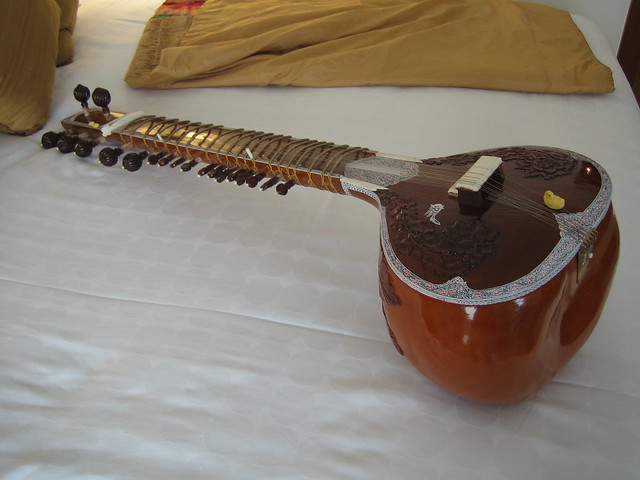 |
| Photo by aplumb |
This exotic instrument consists of 18 to 23 strings. There are usually 6-7 main strings on top and 11 or more on the bottom call sympathetic strings. These are meant to be used as a drone to give the instrument more musical depth.
The sitar is made of a large neck and a gored for the base. It is mostly played in a traditional sitting position and played with a metal pick, which is called a mizrab.
If you are serious about buying, please keep in mind these three tips.
Tip One.
Make sure you are familiar with where the actual sitar came from. It's very important to track where it was made. Wherever you buy the sitar, do some research on the Internet as to where it was made. The majority of sitars are mass-produced in Northern India and sell for around $200 to $500, these tend to be fake. If you're a lefty, like me, almost all the sitars out there on the Internet or major music stores are fake. I have had my fair share of fake sitars and that's why I am writing this article.
Tip two
Find out how long its been sitting out. Sitars don't do well with humidity or the cold. They are ideal at around 60-80 degrees. Always keep them away from windows or fireplaces/heaters. To test this, play the instrument and listen to hear it go out of tune. If it keeps going out of tune you might have a warped sitar.
Tip Three.
Always check for loose parts. A well-made sitar that's not a decoration piece tends always painted to perfection and the tuners work. If the tuners don't stay in place, chances are you are getting ripped off. Most of the, general music store have no clue where they come from and order them from a catalog to give the store variety. They should always come in a case and have extra strings and picks. Make sure to purchase sitar grade strings, as they are different lengths and gauges.
I highly recommend doing some concrete research before flaunting your credit card around and impulsively buying one of these cool instruments. Always play before you pay!
For more information, find a local sitar teacher in your area for the best advice. Article Source: EzineArticles |

No comments:
Post a Comment